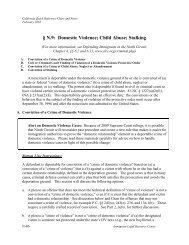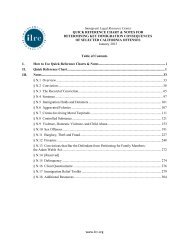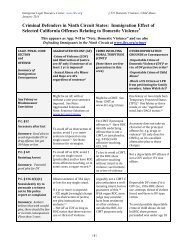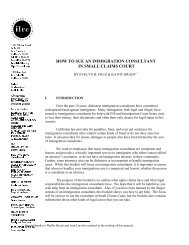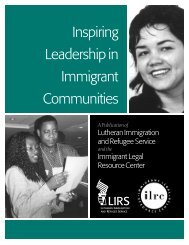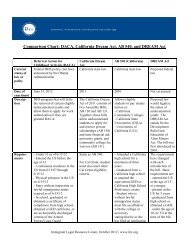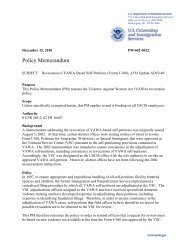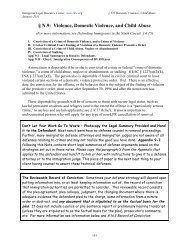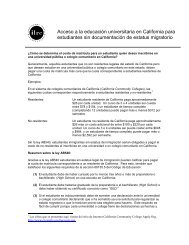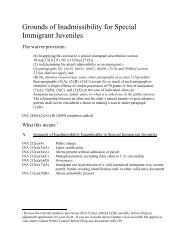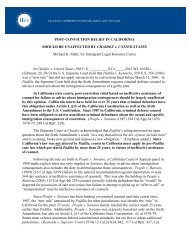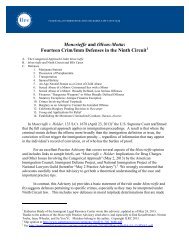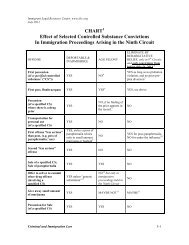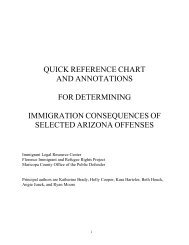Chart C: Derivative Citizenship - ILRC
Chart C: Derivative Citizenship - ILRC
Chart C: Derivative Citizenship - ILRC
You also want an ePaper? Increase the reach of your titles
YUMPU automatically turns print PDFs into web optimized ePapers that Google loves.
Endnotes for <strong>Chart</strong> C: 1 Prior to 1907 a mother could transmit citizenship only if she was divorced or widowed. See DANIEL LEVY, U.S. CITIZENSHIP AND<br />
NATURALIZATION HANDBOOK (Thomson West).<br />
2 It is the <strong>ILRC</strong>’s position, and the <strong>ILRC</strong> believes that all advocates should argue, that the definition of “prior to the 18 th birthday” or “prior to the 21 st birthday”<br />
means prior to or on the date of the birthday. See Duarte-Ceri v. Holder, 2010 WL 4968689 (2d. Cir 2010); Matter of L-M- and C-Y-C-, 4 I. &N. Dec. 617 (1952)<br />
which supports this proposition with respect to retention requirements for acquisition of citizenship; but, see also INS Interpretations 320.2. Yet, CIS officers<br />
may not agree with the <strong>ILRC</strong>'s position that the definition of "prior to the 18 th birthday" or "prior to the 21 st birthday" means "prior to or on the 18 th birthday" or<br />
"prior to or on the 21 st birthday."<br />
3 Prior to 1907 the child could take up residence in the U.S. after turning 21 years of age. See DANIEL LEVY, U.S. CITIZENSHIP AND NATURALIZATION<br />
HANDBOOK (Thomson West) (citing Sec. 5, Act of March 2, 1907).<br />
4 Legitimation could take place before or after the child turns 21. The child derives citizenship upon the naturalization of the parent(s) or upon the child taking<br />
up residence in the U.S. See DANIEL LEVY, U.S. CITIZENSHIP AND NATURALIZATION (Thomson West), citing Sec. 4, Act of 1802 as supplemented by Sec. 5, Act<br />
of 1907. See also INS Interpretations 320.1.<br />
5 The five year period can commence before or after the naturalization of the parent and can last until after the child turns 21 and until after 1941. See Sec. 5, Act<br />
of March 2, 1907 as amended by Sec. 2, Act of May 24, 1934 and INS Interpretations 320.1(a)(3).<br />
6 See endnote 4 above.<br />
7 “Legal separation” of the parents can be a complicated topic. In Matter of H, 3 I&N Dec. 742 (BIA 1949), the BIA found that “Legal Separation” as used in the<br />
context of derivation of citizenship means some sort of limited or absolute divorce through judicial proceedings. Several appeals courts have weighed in on the<br />
issue as well and now there is a split in circuit courts regarding the definition of legal separation. Volume 11 of Bender’s Immigration Bulletin has an excellent<br />
article on the definition of legal separation for derivation purposes. See Bender’s Immigration Bulletin, Volume 11, Page 694 (June 1, 2007). See also Wilson v.<br />
Mukasey, 2008 U.S. App. LEXIS 681 (9th Cir. 2008); Lewis v. Gonzales, 481 F.3d 125, 130-32 (2d Cir. 2007); Hamilton v. Mukasey, 2007 U.S. App. LEXIS<br />
27835 (2d Cir. 2007); Claver v. United States Atty Gen., 2007 U.S. App. LEXIS 20490 (11th Cir. 2007); Afeta v. Gonzalez, 467 F.3d 402 (4th Cir. 2006); Bagot v<br />
Ashcroft, 398 F.3d 252 (3rd Cir. 2005); Minasyan v. Gonzales, 401 F.3d 1069 (9th Cir. 2005); Wedderburn v. INS, 215 F.3d 795, 799 (7th Cir. 2000); and Nehme<br />
v. INS, 252 F.3d 415, 422 (5th Cir. 2001); but see Brissett v. Ashcroft, 363 F. 3d 130, 132 (5th Cir. 2004) (while the court denied that Brisett derived citizenship,<br />
the court found that there could be an order that doesn’t necessarily state it creates a legal separation, but “may nonetheless effect such a drastic change in the<br />
couple’s marital existence that the couple may be considered legally separated” for the purposes of 8 USC § 1432(a)(3)”). Note that in Henry v. Quarantillo,<br />
2010 WL 447385 (E.D.N.Y. 2010), although the district court noted the possibility of “legal separation” of unwed parents according to a change to Jamaican law<br />
in 2005, it viewed eligibility for derivative citizenship by examining the state of affairs at the time that an applicant’s parent naturalized, which in this case was<br />
1972.<br />
8 See 7 FAM 1153.4-3 (Foreign Affairs Manual). Until recently, the general rule was that if the parents have a joint custody decree (legal document), then both<br />
parents have legal custody for purposes of derivative citizenship. See DANIEL LEVY, U.S. CITIZENSHIP AND NATURALIZATION (Thomson West Publications),<br />
citing Passport Bulletin 96-18 (November 6, 1996). Yet, in the 5th Circuit, the court of appeals recently ruled that the naturalizing parent must have sole legal<br />
custody for the child to derive citizenship and thus, at least in the 5th Circuit, a joint legal custody decree will not be sufficient to allow a child to derive<br />
citizenship. See Bustamante-Barrera v. Gonzalez, 447 F.3d 388 (5th Cir. 2006) (requiring naturalized citizen parent to have sole legal custody of the child for<br />
derivative citizenship). See also Rodrigues v. Attorney General of U.S., 321 Fed. Appx. 166, 2009 WL 984511 (3rd Cir. 2009). The <strong>ILRC</strong> believes these two<br />
cases include faulty reasoning and practitioners should be prepared to argue so if the CIS or other courts follow the Bustamante case.<br />
When the parents have divorced or separated and the decree does not say who has custody of the child and the U.S. citizen parent has physical custody<br />
(meaning the child lives with that parent), the child can derive citizenship through that parent provided all the other conditions are met. See United States<br />
Department of State Passport Bulletin 96-18, issued November 6, 1996, entitled "New Interpretation of Claims to <strong>Citizenship</strong> Under Section 321(a) of the INA"<br />
which referenced Passport Bulletin 93-2, issued January 8, 1993.<br />
According to INS Interpretations 320.1, in the absence of a state law or adjudication of a court dealing with the issue of legal custody, the parent having<br />
actual uncontested custody of the child is regarded as having the requisite legal custody for "derivation purposes," provided the required "legal separation" of the<br />
parents has taken place. See INS Interpretations 320.1(b), Matter of M-, 3 I&N 850 (BIA 1950). Where the actual “parents” of the child were never lawfully<br />
married, there can be no legal separation. See INS Interpretations 320.1(a)(6), citing In the Matter of H –, 3 I&N Dec. 742 (BIA 1949). Thus, illegitimate<br />
children cannot derive citizenship through a father's naturalization unless the father has legitimated the child, the child is in the father's legal custody, and the<br />
mother was either a citizen (by birth or naturalization) or the mother has died. Where the actual “parents” of the child were never lawfully married, there could<br />
be no legal separation. For more on this topic, please see Bagot v. Ashcroft, 398 F.3d 252 (3rd Cir. 2005) and Nehme v. INS, 252 F.3d 415 (5th Cir. 2001).



